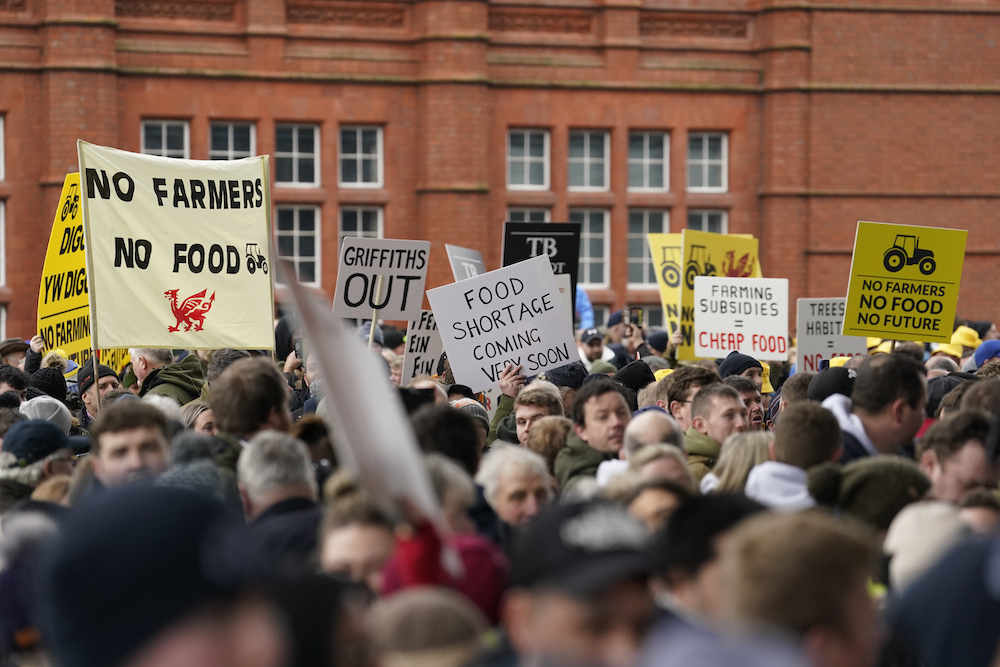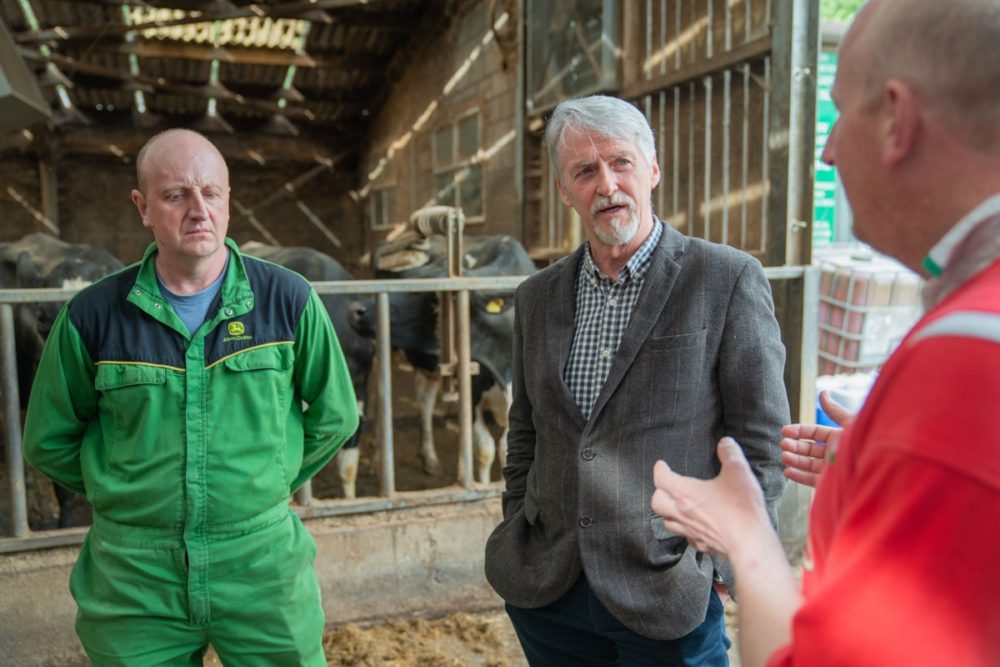Welsh Government announces changes to controversial farming payment scheme

Farmers in Wales will not be expected to have a minimum of 10% tree cover on their land, after changes to a controversial subsidy scheme.
Huw Irranca-Davies, the deputy first minister of Wales, confirmed a number of changes to the Welsh Government’s controversial sustainable farming scheme.
The scheme, which resulted in thousands of farmers protesting outside the Welsh Parliament in Cardiff Bay in February, was widely criticised by opposition parties and farming leaders.
Mr Irranca-Davies said changes to the scheme addressed the needs of Welsh farmers while supporting sustainable production of food, as well as climate change and nature commitments.
“Stewards of our land”
Speaking from the Royal Welsh Winter Fair, he said: “Following the consultation, it was clear changes were needed, we said we would listen and we’ve done just that.
“Farmers are at the heart of communities right across Wales, and they play a crucial role in our economy and food production.
“As stewards of our land, they also have a key role to play in protecting and restoring nature and tackling the climate emergency.”
Changes to the scheme include the removal of a farm-level figure for tree cover, which will be replaced with a scheme-wide target.
A spokesman said: “Farmers will therefore no longer be asked to have a minimum of 10% tree cover on their land.”
Farmers who apply for the scheme will be able to decide where they want to add more trees or hedges on their farm and how many, with funding to support them through the optional part of the scheme.
However, farmers will still be required to manage at least 10% of their farm as habitat.
The Welsh Government is now considering options to create temporary habitat to help farmers meet this requirement, which should be suitable for all farming systems and land ownership.
Actions relating to animal health, welfare and biosecurity have been merged to focus discussions with the farm vet on improved health and welfare outcomes, the spokesman added.
The scheme had included a requirement for all farms to have wash stations, where equipment is cleaned, but this is now optional.
Additional payments will be made for social value under the universal part of the scheme, representing the “wider benefits which come from a sustainable agricultural industry”, the Welsh Government said.

Mr Irranca-Davies added that the updates represented “significant progress” but they were not the final scheme, with a decision to be made on this next summer.
Details of payment rates will not be provided until then.
“We are developing a scheme which is designed to support all farmers in Wales, based on the completion of a set of universal actions,” he said.
“These actions will be familiar to farmers in Wales, whether beef, dairy, arable, upland, lowland, extensive or intensive. They are actions many of them take on a day-to-day basis.”
Sustainability
He said the scheme would support the “economic resilience” of farming businesses, the sustainable production of food, as well as climate and nature objectives, and rural communities.
“We’ve come a long way and there is still more work to do,” he added.
NFU Cymru president Aled Jones, speaking at the Royal Welsh Winter Fair, said it welcomed the “partnership approach” Mr Irranca-Davies had put in place to listen to the concerns of the farming industry.
The union has been involved with the ministerial roundtable and sub-groups.
Mr Jones added: “Welsh Government has confirmed this is not the final scheme design and Welsh ministers have not made any final decisions.
“NFU Cymru is pleased that Welsh Government has committed to undertake economic analysis and an impact assessment of the revised proposals to understand what the scheme will mean for farmers and wider society.”
He called for the new scheme to provide “the same level of stability” to farm businesses, rural communities and the supply chain as the current basic payment scheme.
“There is much more work to do in the coming months on the final scheme detail as well as a number of fundamental aspects of scheme design including the payment methodology and payment rates ahead of the publication of the final scheme, expected in July 2025,” he added.
“Securing Welsh Government’s commitment to a well-funded, multi-annual budget for the scheme that matches the scale of our ambition for sustainable growth of the food and farming sector, alongside the delivery of key environmental outcomes for society, is also going to be crucial.
“We have seen the budget for farming eroded by inflation and subjected to in-year cuts. The need to restore and enhance the budget cannot be overstated.”
Mr Jones added that there was a “huge amount of work to be done on many aspects of the scheme”.
Biodiversity
Lizzie Wilberforce, Plantlife Cymru Lead, said: “We welcome Welsh Government’s continued commitment to require farmers to manage 10% of their land as habitat for biodiversity if they are to benefit from funding available under the new SFS.
“This is a bold starting point for achieving the more ambitious action for nature recovery which the SFS will ultimately need to deliver if the Welsh Government is to reverse the decline in biodiversity in Wales. With 90% of Welsh land being farmed, it is essential that agricultural land contributes towards our nature and carbon targets.
“It is also encouraging to see permanent species-rich grasslands finally getting the recognition they deserve for their role in delivering additional on-farm carbon sequestration and storage, which had previously been overlooked.
“However, Plantlife is concerned that there will not be sufficient support and advice for farmers planning to expand their tree cover which could displace existing habitats of high conservation value or high restoration potential, undermining the scheme’s delivery for nature and climate.
“In addition, we would urge Welsh Government to put in place sufficient finance to provide a full programme of nature focused actions in the Optional layer of SFS, on top of the funding which is being promised for tree planting and carbon sequestration actions.
“Critical”
Wildlife Trusts Wales Director, Rachel Sharp, said: “The Welsh Government have successfully brought together a wide spectrum of organisations to listen to farmers’ concerns. Today’s announcement we hope shows how these concerns have been addressed.
“However, the need to help farms become resilient to climate change means that excluding key elements of water management and shelter for livestock will need addressing in higher tiers of the scheme. We do recognise the continued commitment of farmers in the scheme to manage existing woodland and habitat, along with retaining the 10% habitat scheme requirement.
“However, going forward it will be critical to support the many farmers who want to go beyond this if we are to see nature restored in Wales. To achieve this we now need to see a focus and sufficient budget in the higher tiers of the SFS.
“We need to enable farmers to respond to the climate and nature crisis as only they have the ability to achieve this for Wales.”
Mims Davies, the Shadow Secretary of State for Wales, said: “This latest saga is another example of the left hand not knowing what the right hand is doing.
“Farmers are the custodians of the land and the guarantors of our food security. They deserve certainty, not confusion from the Welsh Government.
“Whilst I welcome the decision to scrap the mandatory 10% tree cover on prime agricultural land, I now call on both Labour governments to drop the controversial inheritance tax which will act as a hammer blow to our farming communities.”
Support our Nation today
For the price of a cup of coffee a month you can help us create an independent, not-for-profit, national news service for the people of Wales, by the people of Wales.





